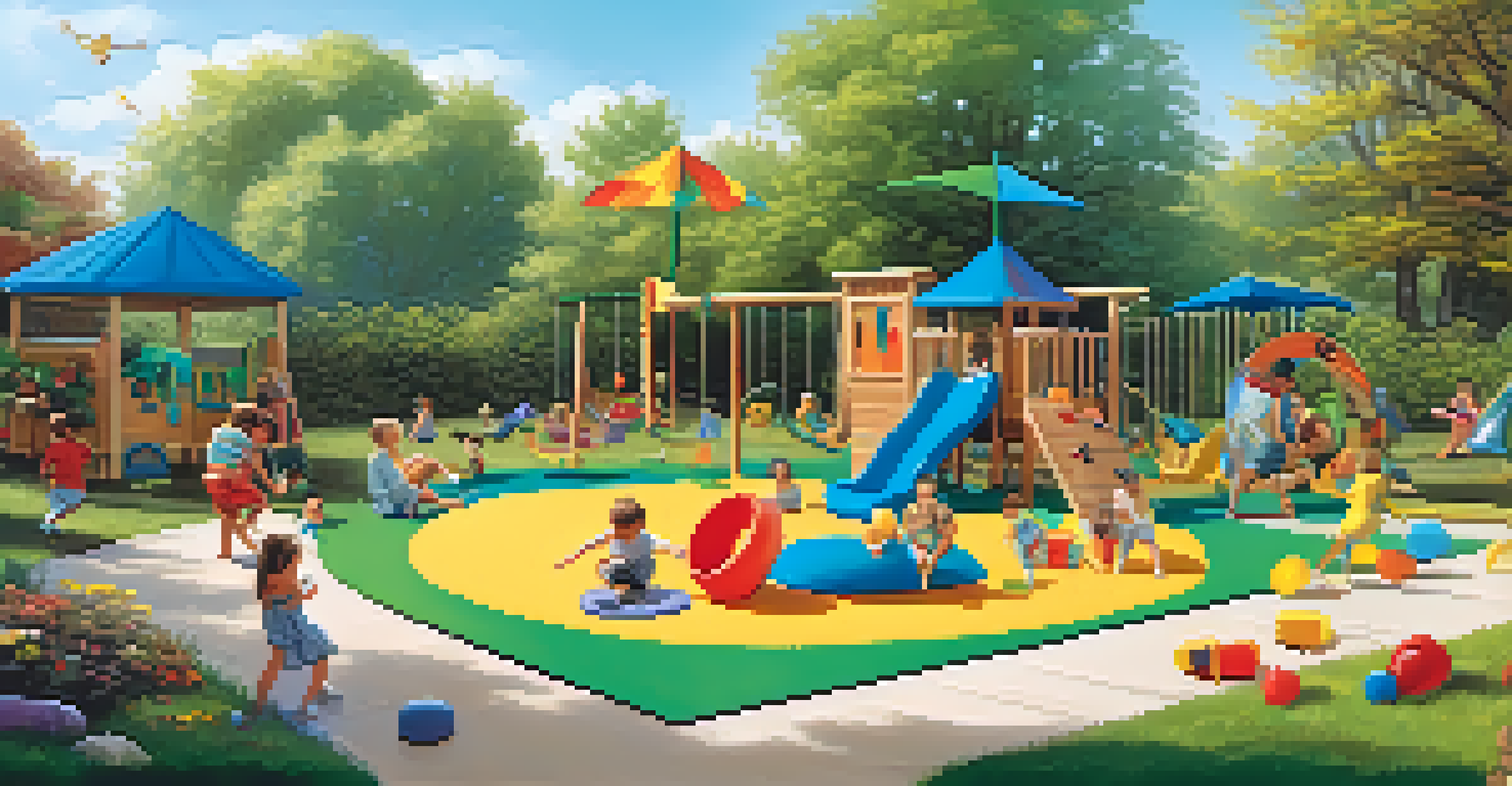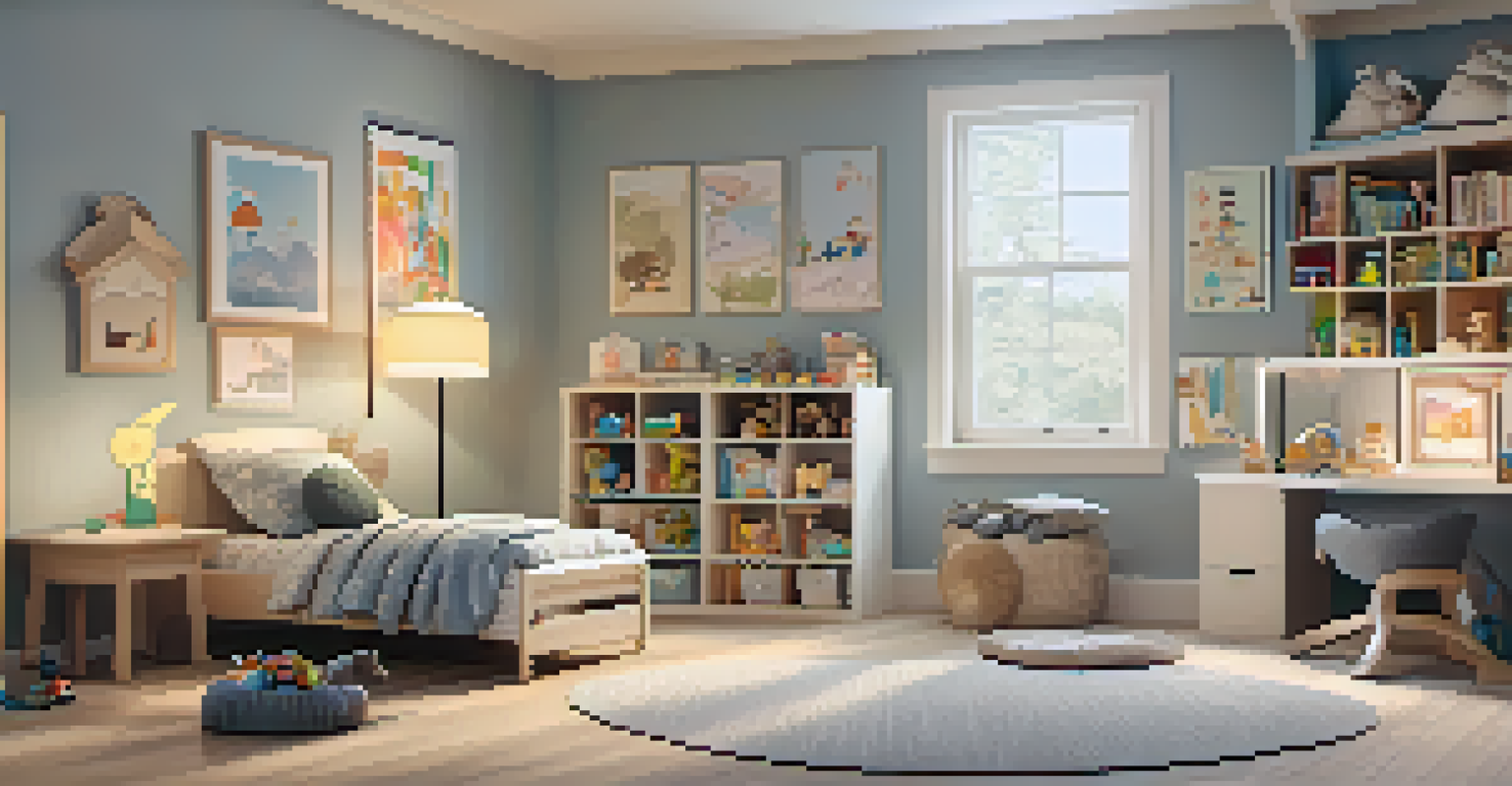Creating a Healthy Home Environment for Kids

Understanding the Importance of a Healthy Home
A healthy home environment is crucial for a child's development. It influences their physical well-being, emotional growth, and cognitive abilities. Children thrive in spaces that promote safety, learning, and creativity, making it essential for parents to focus on their surroundings.
The greatest gifts you can give your children are the roots of responsibility and the wings of independence.
Creating a nurturing atmosphere helps children feel secure and loved, which is fundamental for their emotional health. When kids know they’re in a safe space, they’re more likely to explore, learn, and express themselves freely. The impact of such an environment can last a lifetime.
Moreover, a healthy home encourages good habits. From eating well to staying active, the environment we create can guide children toward making positive lifestyle choices. It's not just about the physical space; it's also about the values and behaviors we model every day.
Designing Safe Play Areas for Kids
Play is vital for a child's development, so creating safe play areas is essential. Whether it's a corner of the living room or a backyard, these spaces should be free from hazards. Use soft materials, ensure toys are age-appropriate, and keep sharp objects out of reach.

Incorporating elements like cushions or mats can help prevent injuries during play. Additionally, having designated play zones encourages kids to engage in activities that enhance creativity and motor skills. Remember, safety doesn’t mean limiting fun; it can enhance imaginative play.
Healthy Homes Boost Child Development
A nurturing home environment fosters children's physical, emotional, and cognitive growth.
Consider outdoor play as well. A secure yard with simple equipment like swings or slides can provide endless hours of enjoyment while promoting physical fitness. Remember, the goal is to create an environment where kids can play freely and safely.
Incorporating Healthy Eating Habits
A healthy home environment starts with nutrition. Teaching children about healthy eating can be fun and engaging. Involve kids in meal planning and preparation, turning it into a family activity that fosters connection and learning.
Children are not things to be molded, but are people to be unfolded.
Stocking your kitchen with nutritious snacks, like fruits and veggies, sets a foundation for healthy choices. Instead of junk food, make healthier options easily accessible. When kids see colorful fruits and whole grains, they’re more likely to develop a taste for them.
Additionally, discussing the importance of balanced meals can instill lifelong healthy habits. Use relatable anecdotes, such as how certain foods can make them feel strong or energized, to encourage better choices. Remember, it’s about making healthy eating a positive experience.
Encouraging Physical Activity Indoors and Outdoors
Physical activity is vital for children's health, so creating opportunities for movement is essential. Encourage active play indoors with games that promote movement, like dance or obstacle courses. This not only keeps kids fit but also boosts their mood.
Outdoor play should be a regular part of their routine. Whether it’s riding bikes, playing tag, or climbing trees, these activities help develop coordination and social skills. Parents can join in too, making it a fun family bonding experience that promotes fitness.
Routines Provide Stability for Kids
Establishing daily routines helps children feel secure and promotes independence.
Set an example by staying active yourself. Kids are more likely to engage in physical activities when they see their parents doing the same. Make it a family goal to spend time outdoors together, fostering a love for movement in a playful and enjoyable way.
Establishing Routines for Stability
Children thrive on routines, as they provide a sense of security and predictability. Establishing daily schedules for meals, playtime, and bedtime can help kids know what to expect, reducing anxiety and fostering independence. Routines make transitions smoother, especially for younger children.
Incorporate rituals into these routines, like reading a story before bed or having a family meal together. These moments not only provide stability but also strengthen family bonds. Kids will cherish these traditions as they grow.
Flexibility is key, so be open to adjusting routines as needed. Life can be unpredictable, but maintaining a general structure helps kids navigate changes with ease. A balance between routine and flexibility fosters resilience in children.
Creating a Calm and Organized Space
A calm home environment can significantly affect a child's ability to focus and relax. Keeping spaces organized and clutter-free helps reduce distractions. Teach kids the importance of tidiness by involving them in the process of organizing their toys and personal belongings.
Consider using calming colors in rooms and incorporating elements like soft lighting to create a serene atmosphere. Creating designated quiet areas for homework or reading can also promote concentration and mindfulness. Encourage kids to spend time in these spaces to unwind.
Emotional Intelligence is Key
Encouraging open communication about feelings nurtures emotional intelligence in children.
Additionally, limit screen time to ensure kids engage in more peaceful activities. Encourage reading, drawing, or simply enjoying quiet moments together. Teaching children to appreciate calmness is a valuable life skill that can benefit them in various situations.
Fostering Emotional Intelligence in Children
Emotional intelligence is crucial for a child's overall well-being. Creating a home environment that encourages open communication about feelings is key. Let kids express their emotions freely, and validate their feelings to help them understand and manage them better.
Teach them to recognize different emotions through storytelling or role-playing. Discussing characters' feelings in their favorite books can help kids relate and express their own emotions. This practice fosters empathy and strengthens their social skills.

Modeling emotional intelligence as a parent is equally important. Share your own feelings and coping strategies, showing that everyone has emotions to navigate. By fostering emotional awareness, you equip your children with essential tools for their future interactions.
Promoting Good Hygiene Practices
Good hygiene practices are a fundamental part of a healthy home. Teach kids the importance of regular handwashing, brushing teeth, and bathing. Making these routines fun, such as singing songs while washing hands, can instill lifelong habits.
Set a good example by practicing good hygiene yourself. Kids learn by watching, so when they see their parents prioritizing cleanliness, they’re more likely to adopt these habits. Discuss the benefits of hygiene, such as feeling good and staying healthy.
Creating a structured routine for hygiene can make it a natural part of their day. Incorporate it into their morning and bedtime routines, ensuring they understand its significance. When hygiene becomes a regular practice, it leads to healthier lifestyles.